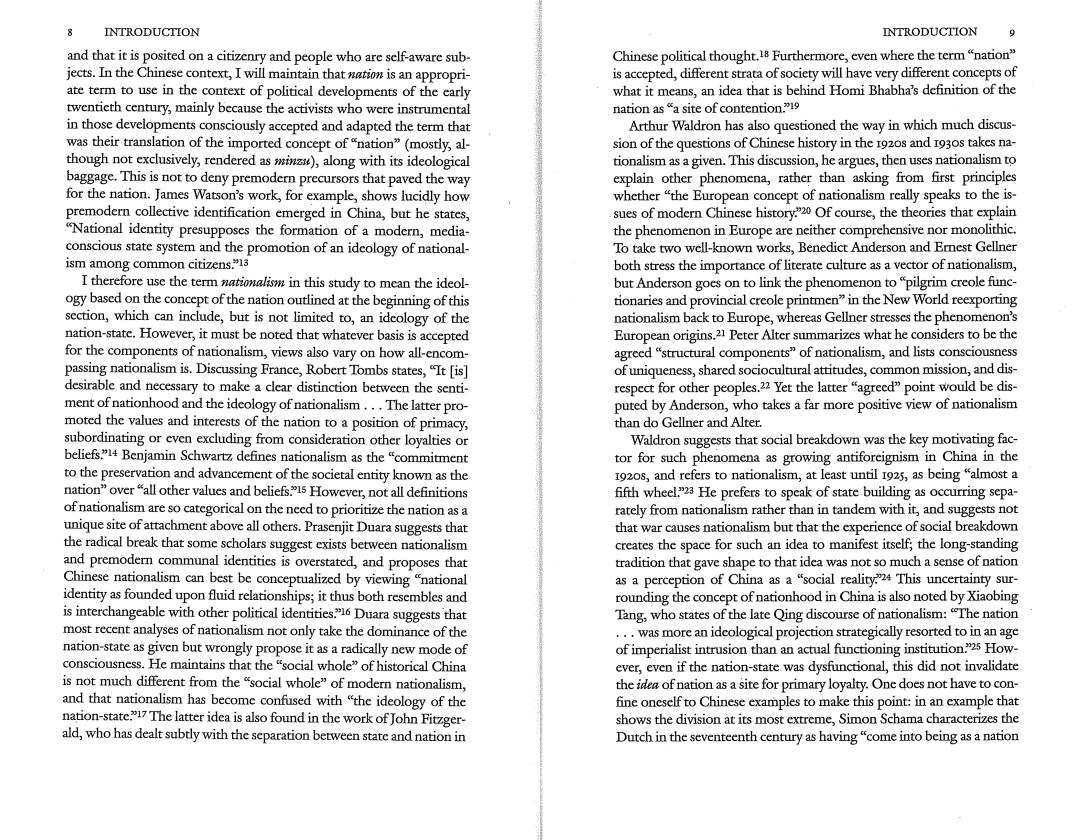正在加载图片...

INTRODUCTION INTRODUCTION 9 and that it is posited on a citizenry and people who are self-aware sub- Chinese political thought.18 Furthermore,even where the term"nation" jects.In the Chinese context,I will maintain that matio is an appropri- is accepted,different strata of society will have very different concepts of ate term to use in the context of political developments of the early what it means,an idea that is behind Homi Bhabha's definition of the twenticth century,mainly because the activists who were instrumental nation as "a site of contention.9 in those developments consciously accepted and adapted the term that Arthur Waldron has also questioned the way in which much discus- was their translation of the imported concept of "nation"(mostly,al- sion of the questions of Chinese history in the rzos and 193os takes na- though not exclusively,rendered as),along with its ideological tionalism as a given.This discussion,he argues,then uses nationalism to baggage.This is not to deny premodern precursors that paved the way explain other phenomena,rather than asking from first principles for the nation.James Watson's work,for example,shows lucidly how whether "the European concept of nationalism really speaks to the is- premodern collective identification emerged in China,but he states, sues of modern Chinese history"20 Of course,the theories that explain "National identity presupposes the formation of a modern,media- the phenomenon in Europe are neither comprehensive nor monolithic. conscious state system and the promotion of an idcology of national- To take two well-known works,Benedict Anderson and Ernest Gellner ism among common citizens."13 both stress the importance of literate culture as a vector of nationalism, I therefore use the term nationalis in this study to mean the ideol- but Anderson goes on to link the phenomenon to "pilgrim creole func- ogy based on the concept of the nation outlined at the beginning of this tionaries and provincial creole printmen"in the New World reexporting section,which can include,but is not limited to,an ideology of the nationalism back to Europe,whereas Gellner stresses the phenomenon's nation-state.However,it must be noted that whatever basis is accepted European origins.21 Peter Alter summarizes what he considers to be the for the components of nationalism,views also vary on how all-encom- agreed "structural components"of nationalism,and lists consciousness passing nationalism is.Discussing France,Robert Tombs states,"It [is] of uniqueness,shared sociocultural attitudes,common mission,and dis- desirable and necessary to make a clear distinction between the senti- respect for other peoples.22 Yet the latter "agreed"point would be dis- ment of nationhood and the ideology of nationalism...The latter pro- puted by Anderson,who takes a far more positive view of nationalism moted the values and interests of the nation to a position of primacy, than do Gellner and Alter. subordinating or even excluding from consideration other loyalties or Waldron suggests that social breakdown was the key motivating fac- beliefs:14 Benjamin Schwartz defines nationalism as the "commitment tor for such phenomena as growing antiforeignism in China in the to the preservation and advancement of the societal entity known as the I920s,and refers to nationalism,at least until 1925,as being"almost a nation"over"all other values and beliefs.15 However,not all definitions fifth wheel.23 He prefers to speak of state building as occurring sepa- of nationalism are so categorical on the need to prioritize the nation as a rately from nationalism rather than in tandem with it,and suggests not unique site of attachment above all others.Prasenjit Duara suggests that that war causes nationalism but that the experience of social breakdown the radical break that some scholars suggest exists between nationalism creates the space for such an idea to manifest itself;the long-standing and premodern communal identities is overstated,and proposes that tradition that gave shape to that idea was not so much a sense of nation Chinese nationalism can best be conceptualized by viewing "national as a perception of China as a "social reality.24 This uncertainty sur- identity as founded upon fluid relationships;it thus both resembles and rounding the concept of nationhood in China is also noted by Xiaobing is interchangeable with other political identities6 Duara suggests that Tang,who states of the late Qing discourse of nationalism:"The nation most recent analyses of nationalism not only take the dominance of the ..was more an ideological projection strategically resorted to in an age nation-state as given but wrongly propose it as a radically new mode of of imperialist intrusion than an actual functioning institution"25 How- consciousness.He maintains that the"social whole"of historical China ever,even if the nation-state was dysfunctional,this did not invalidate is not much different from the "social whole"of modern nationalism, the idea of nation as a site for primary loyalty.One does not have to con- and that nationalism has become confused with "the ideology of the fine oneself to Chinese examples to make this point:in an example that nation-state.17 The latter idea is also found in the work of John Fitzger- shows the division at its most extreme,Simon Schama characterizes the ald,who has dealt subtly with the separation between state and nation in Dutch in the seventeenth century as having"come into being as a nation